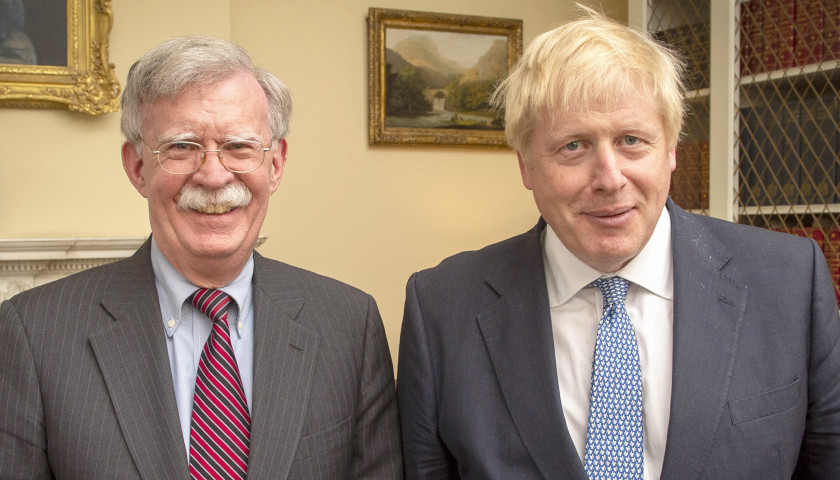White House enthusiasm for a trade deal with the United Kingdom is palpable.
Secretary of State Mike Pompeo told the visiting British Foreign Secretary Dominic Raab on Aug. 7 that the U.S. will be ready, “pen in hand,” to sign “a new free trade agreement at the earliest possible time.”
U.S. National Security Adviser John Bolton, meanwhile, traveled this week to London to assure officials that the Trump administration will put Britain at the front of the queue in trade talks.
But the prospects for a deal are much more complicated in Congress, which appears to be split between supporters of British Prime Minister Boris Johnson’s government, however, Brexit comes about, and supporters of Ireland, many of whom still identify with the “emerald isle” all these generations later.
Speaker Nancy Pelosi, who leads the 435-member House of Representatives, recently reiterated a position she took in a speech to the Irish Parliament in April, saying the United States “must ensure that nothing happens in the Brexit discussions that imperils the Good Friday accord, including but not limited to the seamless border between the Irish Republic and Northern Ireland.”
The success of that U.S.-mediated 1998 agreement, ending decades of strife between Catholics and Protestants in Northern Ireland, depended largely on the free movement of goods and people between the independent Republic of Ireland and British-ruled Northern Ireland while both were part of the European Union.
“If the Brexit deal undermines the accord, there will be no chance of a U.S.-U.K. agreement,” Pelosi warned.
I had a great meeting with UK Prime Minister Boris Johnson yesterday. We discussed trade, security, and opportunities to deepen our bilateral relationship after the UK leaves the EU. The US and UK are on course for an unprecedented partnership. pic.twitter.com/wVWp8Mhaza
— John Bolton (@AmbJohnBolton) August 13, 2019
Friends of Ireland
The British government insists it is committed to the Belfast Agreement and the seamless border, but Johnson and his supporters have rejected the so-called “backstop” negotiated by his predecessor to ensure there is no need for a hard border on the island. Irish authorities remain worried, and their concerns are shared by the Friends of Ireland caucus in the U.S. Congress, which is dedicated to promoting U.S.-Irish ties.
A leader of that caucus is Richard Neal, a Democrat and an Irish-American who also happens to be chair of the powerful House Ways and Means Committee which oversees trade deals. Peter King, a Republican who also claims Irish heritage, has said he, too, would oppose Trump on a trade deal if the Northern Ireland issue is not satisfactorily resolved.
Support for a deal is coming from the likes of Senator Tom Cotton of Arkansas, who has drafted a letter to Johnson and secured signatures from 44 of his Senate colleagues, all members of the Republican Party. The letter underscored longstanding political and security ties between the U.S. and Britain.
“Our soldiers have fought together from the beaches of Normandy to the mountains of Afghanistan,” reads the letter. “Irrespective of how Brexit occurs, we recommit to the NATO security alliance and the Five Eyes’ intelligence partnership. We also will advocate for a new bilateral trade agreement, as early as your Brexit terms would allow.”
Jacob F. Kirkegaard, an economist at the Peterson Institute for International Economics (PIIE), told VOA in a written response to questions that he doubts any deal will be completed quickly.
“Forty-plus GOP senators cannot pass an FTA in Congress on their own,” he wrote, adding that negotiations will be complicated by next year’s U.S. presidential and Congressional election campaigns. “There is zero chance that any U.K.-U.S. deal will go before Congress and is approved before the election.”
Irish roots
Daniel Mulhall, Ireland’s ambassador to Washington, appreciates the fact that when it comes to U.S. policy, his country stands to benefit from Irish-Americans’ affinity with the old country.
“We’re fortunate that because of immigration in the 19th century, so many Americans identify with Ireland,” he told VOA earlier this year. “There are 33 million Americans that have Irish heritage, many of them are very proud of their Irish heritage, and it’s a big advantage for Ireland to have so many people in this country that have an affection for Ireland and are supportive of all things Irish. That’s a big, big plus for Ireland in the United States.”
Mulhall added that wherever he travels in the United States, “I meet people of Irish descent who may be three or four generations, or more, removed from Ireland but still identify strongly with our country.”
In fact, about 10% of the U.S. population claimed Irish heritage in a 2017 survey by the U.S. Census Bureau. That includes Vice President Mike Pence, who proudly shared his Irish roots in a July 4th tweet and is reportedly planning to visit Ireland with his family next month.
– – –
Photo “John Bolton and Boris Johnson” by John Bolton.




